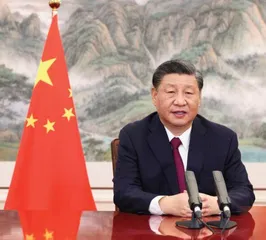Xi Jinping Thought on Diplomacy: China’s Solution to Solve the Problems of Our Times
作者: Zhang Lili

Xi Jinping Thought on Diplomacy, as an important integral part of Xi Jinping Thought on Socialism with Chinese Characteristics for the New Era, provides the fundamental rules and a guide to action for China’s diplomatic work in the new era. Coming into being and developed against the background of historic changes occurring to China’s relations with the rest of the world, Xi Jinping Thought on Diplomacy mainly includes a series of concepts, propositions and proposals on Chinese diplomacy, foreign relations and international relations put forward by General Secretary Xi Jinping since the 18th CPC National Congress in 2012. Being rich in connotations, it can be summarized into “Ten Upholds”, with peace, development and win-win cooperation as basic point of departure. Proceeding from the common interests and common values of humanity, General Secretary Xi Jinping has creatively presented a series of new concepts and new initiatives, offering China approach in tackling the question of our time, namely what has happened to the world and what is to be done about it.
UPHOLDING TRUE MULTILATERALISM
At present, profound changes and a pandemic both unseen in a century have produced compound impact on the world, with intensified geopolitical conflicts and great power contest. As an important participant and contributor of global governance system, China has always upheld the international system with the United Nations (UN) at its core, the international order based on international law, and the basic norms of international relations underpinned by the purposes and principles of the UN Charter, and upheld a global governance outlook featuring extensive consultation, joint contribution and shared benefits, being opposed to unilateralism and true to multilateralism, actively developing global partnership, and jointly promoting with concrete actions the construction of a global governance system that is equitable and just.
On major issues such as where is the future of humanity, General Secretary Xi Jinping proposes with foresight the important concept of building a community with a shared future for mankind, emphasizing that the people of all countries should unite and join hands in building a community with a shared future for mankind. Upholding dialogue and consultation, joint contribution with shared benefits, cooperation with win-win results, mutual learning, and green and low carbon development in building a world with lasting peace, universal security, and common prosperity, a world that is open, inclusive, clean and beautiful. The close links between countries of the world have come about naturally, and they cannot easily be decoupled or embargoed by any countries or any leaders. China firmly opposes beggar-thy-neighbor unilateralism and protectionism but rather stands for tolerance and inclusion with the rest of the world, for mutual learning, sharing development results, and more closely connecting common destiny of all humanity. In face of major issues relating to peace and development that the world today direly needs to tackle, to which Western approach is stuck in the mud of zero-sum game and Cold War mentality, in an attempt to maintain their old hegemony and control of international affairs. Against this backdrop, Xi Jinping Thought on Diplomacy brings to the fore the concept of a community with a shared future for mankind, which goes with the tide of our times, underscores shared dignity, shared development results, and shared guarantee of security of the people of all countries, aiming to truly achieve equality and common development of all countries in the world.
Facing challenges of various uncertainties, all countries should fully understand the value concepts of peace, development and win-win cooperation reflected in the global governance outlook featuring consultation, joint contribution and shared benefits. The principle of consultation, joint contribution and shared benefits embodies Chinese wisdom in a changing global governance system. As a promoter of upholding and practicing true multilateralism, China insists on equality among all countries, big and small, calls on people to talk over their differences, seeking to handle them properly through consultation, by which all countries ought to make joint efforts to resolve issues of world social and economic development. As a responsible major country, China has proposed the Belt and Road Initiative (BRI), the Global Development Initiative (GDI), and the Global Security Initiative (GSI), organized the launching of the Asian Infrastructure Investment Bank and the New Development Bank, and made unique contributions on practical level to pushing changes on the global governance system toward equity and justice.
General Secretary Xi Jinping has put forward the global governance outlook featuring consultation, joint contribution and shared benefits and promoted the concept of building a community with a shared future for mankind, which plays an important role in promoting the process of democratization of international relations. Against the background of ever complicating international relations, hegemonism and power politics have become even less popular. The fact testifies that global issues should be dealt with by common efforts of all countries, and that to go by the principle of multilateralism based on international law is both the core and important manifestation of the global governance outlook and an important way to push the international order to continuously move toward democracy, equity and justice. In 2017, the 71st UN General Assembly adopted a resolution on the UN and global economic governance, into which is written China-proposed principle of extensive consultation, joint contribution and shared benefits. As a member of almost all universal intergovernmental organizations and a signatory to over 600 international conventions and amendments, China has provided assistance of all kinds to more than 160 countries, and extensively helped the least developed countries through China projects. The diplomatic practices above give a vivid rendition of the spirit core of the global governance outlook that features extensive consultation, joint contribution and shared benefits, and have important bearings on promoting the building of a community with a shared future for mankind.